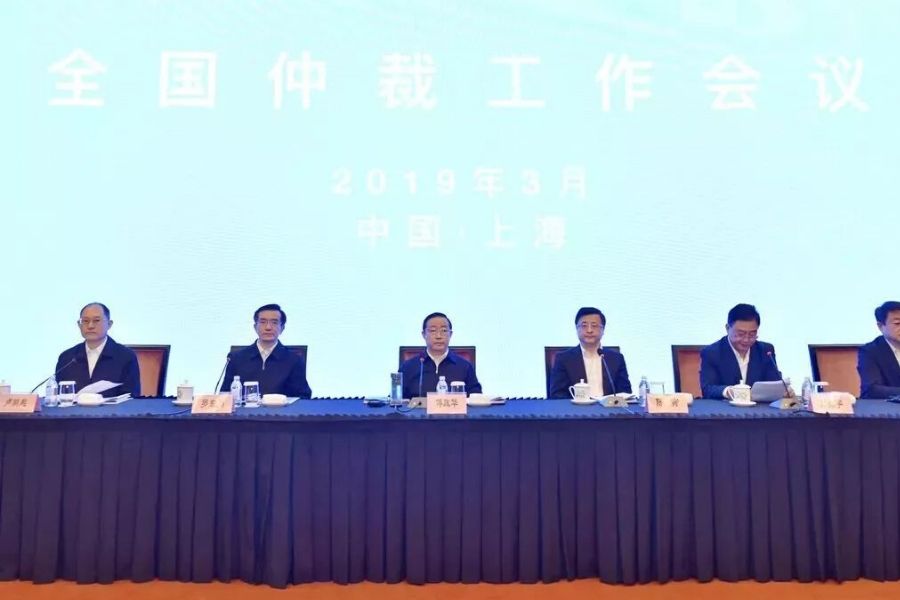
How big is the arbitration market in China? What will happen in the future?
On 28 March 2019, China's Ministry of Justice convened the "National Conference on Arbitration Work" (全国仲裁工作会议). Some information disclosed at the conference will help you to quickly understand the full picture of Chinese arbitration.
1. The Noteworthy Numbers
Modern arbitration in China began in 1994 when China promulgated the "Arbitration Law of the People's Republic of China" (中华人民共和国仲裁法). Since 1994, all arbitral institutions in China have handled over 2.6 million civil and commercial cases of various types, with the total amount of over 4 trillion yuan (about 600 billion US dollars) involved and the parties coming from more than 70 countries and regions. By the end of 2018, there have been 255 arbitration committees in China, with more than 60,000 practitioners in the arbitration field.
For the whole year of 2018, Chinese arbitral institutions handled 540,000 cases, up 127 percent from 2017. The total amount involved in the cases was nearly 700 billion yuan (about 100 billion US dollars), an increase of 30 percent over 2017. Among these cases, there were more than 3,600 foreign-related arbitration cases covering more than 70 countries and regions.
According to the speech delivered at the conference by Judge Luo Dongchuan (罗东川), the SPC's Vice President (and also the first director of the newly established intellectual property court of the SPC), the data on arbitration cases accepted by Chinese courts in the past three years are as follows:
- Of the 27,178 cases accepted for confirmation of the validity of arbitration agreements, 26,632 cases were closed, of which 4,535 cases were deemed to have valid arbitration agreements by the courts, and 616 cases were found to have invalid arbitration agreements, accounting for 2.3 percent of the total closed cases.
- 22,595 cases of application for revocation of arbitral awards were accepted and 22,581 cases were closed, of which 2,050 were decided by the courts to revoke or partially revoke arbitral awards, 15,156 were rejected, and 1,417 were settled through mediation. The cases of revoking arbitral awards make up 9 percent of the total closed cases.
- Accepting 790,523 cases of application for enforcement of domestic arbitral awards, with 791,840 cases closed, the courts ruled that arbitral awards would not be enforced in 10,415 cases, accounting for 1.3 percent of the total closed cases.
2. About "National Conference on Arbitration Work"
National Conference on Arbitration Work was convened by China's Ministry of Justice in Shanghai on 28 March 2019. The Ministry of Justice is the highest guiding and supervising authority in China's arbitration field, and its subordinate "Public Legal Service Administration" is specifically responsible for this work.
Judge Luo Dongchuan (the SPC's Vice President) attended the conference. In China, the courts are responsible for judicial review of arbitration and enforcement of arbitral awards. For this reason, the SPC has issued a number of judicial interpretations in the last three years, which are respectively aimed at property preservation in arbitration, the trial procedure and the reporting and approval procedure in the judicial review of arbitration, as well as enforcement of arbitral awards, etc.
The heads from China's leading arbitral institutions also participated in the conference, such as China International Economic and Trade Arbitration Commission (CIETAC), Beijing Arbitration Commission (BAC), and arbitral institutions in Shenzhen, Guangzhou, Xiamen and Xi 'an.
3. "Chinese Arbitration in 2022" Plan
Mr. Fu Zhenghua (傅政华), Minister of Justice, stated at the conference that China will carry out the "Chinese Arbitration in 2022" Plan, namely, China will achieve the following goals in 2022:
To make Chinese arbitral institutions cooperate with each other to satisfy China's domestic needs, to reflect China's international status and to meet the needs of internationalization;
- To combine the guidance and supervision of the Ministry of Justice on arbitration with the autonomy of the arbitration industry in a reasonable way;
- To improve the professional level of the staff in arbitral institutions;
- To improve the credibility of arbitration, and also to greatly increase the proportion of cases with speedy trials, the proportion of cases that are settled through mediation and reconciliation, and the proportion of cases where arbitral awards are automatically performed;
- To establish a global and regional "brand" of Chinese arbitration so as to strengthen the international influence and voice of Chinese arbitration;
- To greatly increase the probability of the parties choosing arbitration as their preferred dispute settlement method, thus making arbitration an important means of civil and commercial settlement resolution;
- To establish a new supervision model for arbitration in China, namely, arbitral institutions shall be under the leadership of the Communist Party of China (CPC) and be established by the government, arbitral institutions shall operate independently and be autonomous by the arbitration industry, and the arbitration shall be subject to judicial and social supervision.
Mr. Fu Zhenghua also mentioned some specific measures, such as:
- China will focus on fostering arbitral centers with regional and even global influence;
- The party autonomy in arbitration will be more respected;
- Optimizing the internal management of arbitral institutions;
- Promoting online arbitration;
- Punishing the irregularities in the arbitration industry;
- Preparing for the establishment of China Arbitration Association;
- Initiating the revision of the Arbitration Law.
4. Why does China attach so much importance to arbitration
In fact, as early as before the conference, the CPC had already expressed its concern for arbitration, and on 31 December 2018, it specially issued "Several Opinions on Improving the Arbitration System and Enhancing the Credibility of Arbitration" (关于完善仲裁制度提高仲裁公信力的若干意见).
China attaches such importance to arbitration because:
Firstly, Chinese courts are facing a litigation explosion. Therefore, China hopes to support the alternative dispute resolution (ADR), in particular, arbitration, to enable them to assume more fully their roles.
Secondly, China hopes to apply arbitration to the settlement of commercial disputes in the "Belt and Road Initiative" (BRI) and to promote the arbitration in the BRI-related international commercial cases by China's domestic arbitral institutions with a good reputation in the world.
Thirdly, China hopes to improve the international competitiveness and voice of "Chinese Arbitration", such as making some arbitral institutions become arbitration brands with international influence, participating in the formulation of international arbitration rules, and trying to apply arbitration in international investment disputes.
5. Our Commentary
The Arbitration community runs on a free competitive market. China's domestic arbitral institutions need to compete for business with each other, and Chinese arbitral institutions also need to compete for business with arbitral institutions in other countries. This all requires arbitral institutions in China to demonstrate sufficient credibility.
The government of China has been obviously aware of this. The National Conference on Arbitration Work has already released such a signal.
However, it still remains to be observed that how far Chinese arbitral institutions can go.
If you would like to discuss with us about the post, or share your views and suggestions, please contact Ms. Meng Yu (meng.yu@chinajusticeobserver.com).
If you wish to receive news and gain deep insights into the Chinese judicial system, please feel free to subscribe to our newsletters (subscribe.chinajusticeobserver.com ).
Huang Yanling also contributes to the post.
Contributors: Guodong Du 杜国栋 , Meng Yu 余萌









